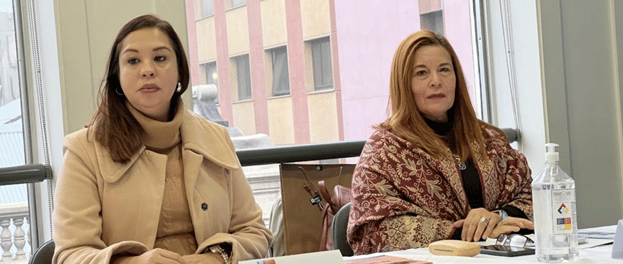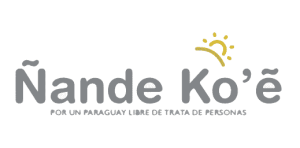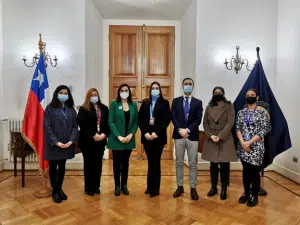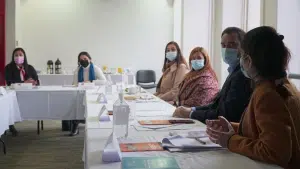Paraguay’s MOW officials Mónica Zayas (left) and Fani Fernández (right).
On June 8-9, 2022, two officials from the Ministry of Women (MOW) of Paraguay traveled to Santiago, Chile to participate in an exchange of good practices for assisting trafficking in persons (TIP) victims with Chile’s Ministry of the Interior and Security (MIS) and the Ministry of Women and Gender Equity (MWGE). The series of meetings took place as part of the “Memorandum of Understanding (MOU) to strengthen the Prevention, Investigation and Assistance to TIP Victims” that was jointly signed by the governments of Chile and Paraguay on December 1, 2021.
The exchange was carried out with the support of the Ñande Ko’ẽ Project (Guarani for “Our Sunrise”), implemented by Partners of the Americas (Partners) with funding from the United States Department of State (USDOS). Mónica Zayas, General Director for the Prevention and Care against TIP, and Fani Fernández, Director of Assistance to TIP Victims of Paraguay’s MOW attended as the Paraguayan delegation, with Ñande Ko’ẽ’s Project Director, Jaime Torales accompanying them.
The exchange of good practices was attended by authorities of the Chilean Government, Minister of the Interior and Acting Vice President, Izkia Siches Pastén, and Antonia Orellana Guarello, Minister of Women and Gender Equity. During the exchange, officials from Chile’s Ministry of the Interior and Public Security presented the country’s public policies on TIP and their Victim Support Program (VSP). Likewise, Paraguay’s MOW officials shared their experience of comprehensive care for TIP victims.
Chile’s Minister of Interior and Acting Vice President, Izkia Siches Pastén, greets MOW officials at the Palacio de la Moneda in Santiago.
Director General Zayas highlighted that the exchange of good practices is fundamental for them to learn about Chile’s policies for assisting TIP victims.
“We returned very pleased with the knowledge acquired about the Chilean experience,” Zayas said.
She added that they were able to focus on issues related to the management of shelters for TIP victims, as they were eager to know more about the Chilean model to make a comparison with and adjustments to the Paraguayan model. Zayas also stressed that the differences in the Chilean protection mechanism impressed them, as it proposes not only safeguarding within the shelter, but also a comprehensive process of social reintegration of the victim, covering their psychological, legal, and medical needs.
Chile’s Minister of Women and Gender Equity, Antonia Orellana, participates in a session of the “Exchange of Good Practices on TIP” with Paraguay’s MOW officials at the Ministry’s headquarters.
For the MOW officials, one of the highlights of the exchange was the linkage with the Intersectoral Protocol for Care of TIP Victims in Chile. Zayas said that the Chilean protection mechanism includes a medium and long-term plan that reinforces the social reintegration process, which initially includes coverage of basic health and safety needs. At a later stage of the process, it provides vocational trainings and emotional counseling for victims, resulting in a potential job offer to provide them with financial security. According to Zayas, in Paraguay, efforts to provide these services are hindered by budgetary restrictions.
“Offering these services is still a challenge for us in Paraguay. We had previously tried to coordinate efforts with the Ministry of Labor, Employment and Social Security, but truly the Chilean protection model implies a process of complete social reintegration for the victim,” Zayas said. “The Paraguayan model currently provides short and medium-term assistance to TIP victims, not yet managing to implement a long-term plan so that they can leave the shelter and become reintegrated into their communities.”
At the end of the exchange, participants from both countries reflected on the gaps in providing assistance to TIP victims at the regional level and the next steps for the implementation of the MOU. MOW officials committed to sharing the information received during their visit to Chile with their counterpart institutions that also work in the care of TIP victims in Paraguay to further help victims of TIP.







